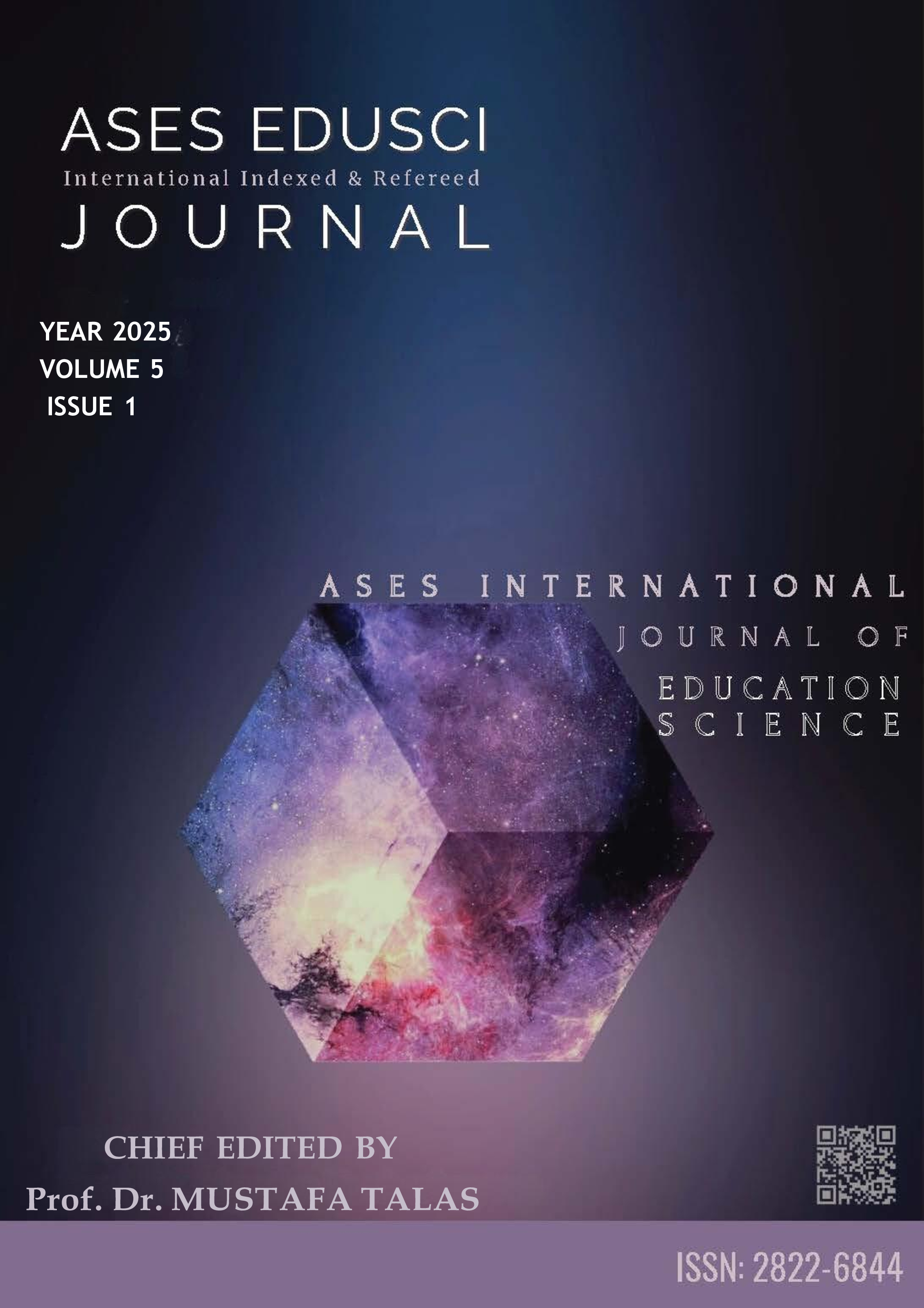Trends in Postgraduate Theses on Mathematics Learning Disability (Dyscalculia) in The Context of Specific Learning Disability in Turkey (2014-2025)
DOI:
https://doi.org/10.5281/zenodo.15719456Keywords:
Specific learning disability, mathematics learning disability, document analysiS, postgraduate theseSAbstract
This study aims to identify the prevailing trends in postgraduate theses focusing on mathematics learning disabilities in Turkey. Within this scope, master's and doctoral theses published between 2014 and 2025, accessible through the Council of Higher Education’s National Thesis Center (YÖKTEZ) database, were examined using document analysis, a qualitative research method. Based on predetermined inclusion and exclusion criteria, a total of 74 postgraduate theses were included in the analysis. These theses were systematically reviewed according to various criteria, including year of publication, type of thesis, distribution by university and institute, department, research model, sample type, data collection tools, analysis techniques, and use of keywords. The findings indicate a notable increase in academic interest in mathematics learning disabilities, particularly within the context of specific learning disabilities, in recent years. The research further reveals that the majority of studies are concentrated in the fields of special education, mathematics education, and primary education, with a predominant preference for qualitative research approaches. This trend reflects a significant quantitative and qualitative expansion of scholarly output in the field.
References
Barbaresi, W. J., Katusic, S. K., Colligan, R. C., Weaver, A. L., & Jacobsen, S. J. (2005). Math learning disorder: Incidence in a population-based birth cohort, 1976–82, Rochester, Minn. Ambulatory Pediatrics, 5(5), 281–289. https://doi.org/10.1367/A04-209R.1
Butterworth, B. (2003). Dyscalculia screener: Highlighting pupils with specific learning difficulties in maths. NFER-Nelson.
Butterworth, B. (2005). Developmental dyscalculia. In J. I. D. Campbell (Ed.), Handbook of mathematical cognition (pp. 455–467). Psychology Press.
Creswell, J. W. (1994). Research design: Qualitative & quantitative approaches. Sage Publications.
Geary, D. C. (1993). Mathematical disabilities: Cognitive, neuropsychological, and genetic components. Psychological Bulletin, 114(2), 345–362. https://doi.org/10.1037/0033-2909.114.2.345
Geary, D. C. (2011). Cognitive predictors of achievement growth in mathematics: A five year longitudinal study. Developmental Psychology, 47(6), 1539–1552. https://doi.org/10.1037/a0025510
Jordan, N. C., Hanich, L. B., & Kaplan, D. (2002). Arithmetic fact mastery in young children: A longitudinal investigation. Journal of Experimental Child Psychology, 83(1), 43–52. https://doi.org/10.1016/S0022-0965(02)00114-1
Karasar, N. (2005). Bilimsel araştırma yöntemi. Nobel Yayın Dağıtım.
Kaufmann, L., & von Aster, M. (2012). The diagnosis and management of dyscalculia. Deutsches Ärzteblatt International, 109(45), 767–778. https://doi.org/10.3238/arztebl.2012.0767
Kaufmann, L., Vogel, S. E., Starke, M., Kremser, C., & Schocke, M. (2013). Numerical and non-numerical predictors of success in mathematical learning and neuroanatomical correlates. Developmental Science, 16(1), 74–86. https://doi.org/10.1111/desc.12007
Koontz, K. L., & Berch, D. B. (1996). Identifying simple numerical computational deficits: A diagnostic screening measure. Learning Disability Quarterly, 19(2), 95–106.
Kosc, L. (1974). Developmental dyscalculia. Journal of Learning Disabilities, 7(3), 164–177. https://doi.org/10.1177/002221947400700309
Mazzocco, M. M. M. (2007). Defining and differentiating mathematical learning disabilities and difficulties. In D. B. Berch & M. M. M. Mazzocco (Eds.), Why is math so hard for some children? The nature and origins of mathematical learning difficulties and disabilities (pp. 29–47). Paul H. Brookes Publishing Co.
Moher, D., Liberati, A., Tetzlaff, J., & Altman, D. G. (2009). Preferred reporting items for systematic reviews and meta-analyses: The PRISMA statement. PLoS Medicine, 6(7), e1000097. https://doi.org/10.1371/journal.pmed.1000097
Morsanyi, K., Devine, A., Nobes, A., & Szűcs, D. (2018). The link between reasoning skills and academic achievement: Evidence from primary school children. PLOS ONE, 13(1), e0191003. https://doi.org/10.1371/journal.pone.0191003
Mutlu, Y. (2016). Diskalkuliye ilişkin öğretmen görüşlerinin değerlendirilmesi. Eğitimde Nitel Araştırmalar Dergisi, 4(1), 52–68.
Nelson, G. M., & Powell, S. R. (2022). Mathematics difficulties in school-age children: Intervention and support strategies. Exceptionality Education International, 32(1), 45–62.
Park, Y., Lee, K., & Shin, H. (2024). Teachers' preparedness and perceptions in supporting students with mathematics learning difficulties. International Journal of Special Education, 39(2), 95–110.
Piazza, M., Facoetti, A., Trussardi, A. N., Berteletti, I., Conte, S., Lucangeli, D., Dehaene, S., & Zorzi, M. (2010). Developmental trajectory of number acuity reveals a severe impairment in developmental dyscalculia. Cognition, 116(1), 33–41. https://doi.org/10.1016/j.cognition.2010.03.012
Sezer, R., & Akın, H. (2011). Diskalkuliye genel bakış: Kavramsal temeller, tanılama ve eğitimsel yaklaşımlar. Eğitim Bilimleri Araştırmaları Dergisi, 1(1), 85–101.
Shalev, R. S., & Gross-Tsur, V. (2021). Developmental dyscalculia: Clinical features and treatment options. Current Opinion in Psychiatry, 34(2), 101–107. https://doi.org/10.1097/YCO.0000000000000673
Soares, D., Evans, B., & Patel, N. (2018). Assessing dyscalculia in the classroom: Limitations and recommendations. Educational Review, 70(1), 91–108. https://doi.org/10.1080/00131911.2018.1423890
Yoong, L. K., & Ahmad, N. A. (2021). The effects of dyscalculia on students’ learning process in mathematics: A systematic review. Journal of Education and Learning, 10(3), 234–242. https://doi.org/10.5539/jel.v10n3p234
Downloads
Published
How to Cite
Issue
Section
License
Copyright (c) 2025 ASES EDUSCI (INTERNATIONAL JOURNAL OF EDUCATIONAL SCIENCES) ISSN: 2822-6844

This work is licensed under a Creative Commons Attribution-NonCommercial 4.0 International License.


